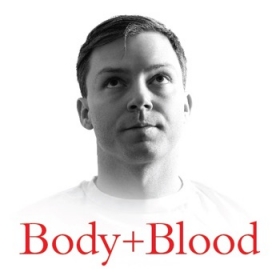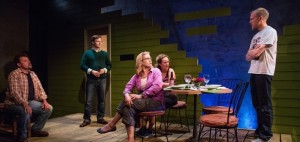
[rating=3]
 Both William Nedved’s play “Body and Blood” and The Gift Theatre’s production of it are a mixed bag. At thirty three, Dan (Nick Harazin) has yet to successfully carve out a life for himself. His Jewish girlfriend, Leah (Cyd Blakewell), and sister, Monica (Lynda Newton), respond compassionately to a genuine “sadness inside of him” that has led to shifting and failed vocational aspirations (to put it mildly) and support him, both emotionally and financially, through his failures. That is until he receives the vocation: he decides he wants to become a priest. This decision seems to have been provoked by a mystical encounter with an oak-tree that occurred on a vacation in Michigan which Leah arranged so that they could get away and think about their future, and where she encouraged him to return to Mass to give him some grounding and to reflect on the responsibilities inherent in fatherhood and family life. In the opening scene, Dan brings Leah, Monica, and his brother-in-law Mick (Stephen Spencer) together to meet the priest who has been counseling him since he expressed desire to enter the priesthood. Father Alex (Gabe Franken) is unsurprised to be met with hostility all around, but dismayed to find out that Dan has not yet broken up with his girlfriend or informed his family of his intent to enter the seminary.
Both William Nedved’s play “Body and Blood” and The Gift Theatre’s production of it are a mixed bag. At thirty three, Dan (Nick Harazin) has yet to successfully carve out a life for himself. His Jewish girlfriend, Leah (Cyd Blakewell), and sister, Monica (Lynda Newton), respond compassionately to a genuine “sadness inside of him” that has led to shifting and failed vocational aspirations (to put it mildly) and support him, both emotionally and financially, through his failures. That is until he receives the vocation: he decides he wants to become a priest. This decision seems to have been provoked by a mystical encounter with an oak-tree that occurred on a vacation in Michigan which Leah arranged so that they could get away and think about their future, and where she encouraged him to return to Mass to give him some grounding and to reflect on the responsibilities inherent in fatherhood and family life. In the opening scene, Dan brings Leah, Monica, and his brother-in-law Mick (Stephen Spencer) together to meet the priest who has been counseling him since he expressed desire to enter the priesthood. Father Alex (Gabe Franken) is unsurprised to be met with hostility all around, but dismayed to find out that Dan has not yet broken up with his girlfriend or informed his family of his intent to enter the seminary.
Harazin gives an incredibly strong performance which mixes confusion, suffering, and determination to pursue a path that finally promises meaning, even as he is abandoned by Leah, for reasons which are obvious: Monica, whose resentment and confusion at Dan’s new metaphysical outlook are mixed with jealousy and concern for her gay son who us about to receive his First Communion and enter the sacramental life of a Mystical Body whose attitudes aren’t evolving at the same speed as American culture; Mick, who believes that this will be the ultimate, unforgivable failure, “you don’t flake out on God;” and even Father Alex who tells Dan that, “many are called, but few are chosen” and whose own relationship to Church doctrine, the priesthood, and Dan are far more complex than they initially appear. Harazin’s dialogue is also the most substantial (fare superior to the other characters), and perhaps aware of this, he is careful to put nuance and tension into every line and gesture. His “act of contrition:” delivered as part soliloquy, part prayer, and part apostrophe at the end of the first act was just one highlight of an extremely, and consistently, noteworthy performance. 
Lynda Newton is credible, both as warm, tender, and elder-sisterly with Dan, and as fierce and loud with nearly everybody else. Cyd Blakewell is everything you could want in an intelligent, strong, snarky, atheist who expresses a visceral and emotional disgust with Catholicism: “such a barbaric view of the world: here is my son: Bon Appetite;” but who still encourages Dan to go to Mass and reflects “it turns out: I can’t be with a man who doesn’t believe in God.” She is a Christopher Hitchens with the redeeming qualities of nuance of thought, healthy living, and charm. Both actresses are able to deliver the sometimes sub-par dialogue with comedy, verisimilitude, and humor, and cultivate personas that for their characters that are realistic and likable in a script in which characterization can be marred by poor dialogue and unrealistic behavior.
Gabe Franken and Stephen Spencer as the Priest and brother-in-law do not fair nearly as well. I realize that their dialogue is the absolute worst: no priest I have ever met spoke in short non-contextual quotations from the Bible. However, their performances are transparently affected, their delivery poor, gestures contrived, and given the fact that both are hiding extremely pertinent and painful secrets: they show no underlying ambivalence to the situation in which Dan and his family find themselves. The set (Joe Shcermoly), Leah’s porch, is almost whimsical: it doesn’t look urban or suburban. In fact if it weren’t so real, it would be like something out of a dream. At the beginning it seems dull and out of place for what is supposed to be a home somewhere in Chicago, but it is used in arresting and interesting ways.
 “Body and Blood” is topical, with strong leads actor, and a tense plot. However, the dialogue ranges from trite one-liners that neither clergy, nor lay people use in discussions of theology and Catholic Culture to obscure Church History and expositions of the Aristotelean Categories used to define Transubstantiation that were, occasionally inaccurate, and often dry and dense, at least for a play. Moreover, the symbols in the play from the oak tree, to Dan’s age (thirty-three: the age at which Jesus is said to have been crucified), to the bread and wine that are being consumed by Leah (which she has to draw attention to, calling them “her two favorite things in the world) fail to transform into anything concrete and meaningful. The Chicago setting has both advantages and disadvantages. Allusions to Mundelein Seminary (of which some of us have heard), Quigley Prep. Seminary (past which most of us have walked), and Old Saint Pat’s (which many of us have been inside) can be fun, help us relate to the characters and their dilemma, and make their world credible. However, they can also become incredibly heavy handed: look we are here, in Chicago! Ultimately, however, strong leads are able to deliver dialogue in a credible and humorous manner, play up the emotional intensity of their situation while director Marti Lyons pacing makes sure that the plot remains tense and that its final revelations are surprising, even if the performances of the supporting character who deliver them are lackluster and bland.
“Body and Blood” is topical, with strong leads actor, and a tense plot. However, the dialogue ranges from trite one-liners that neither clergy, nor lay people use in discussions of theology and Catholic Culture to obscure Church History and expositions of the Aristotelean Categories used to define Transubstantiation that were, occasionally inaccurate, and often dry and dense, at least for a play. Moreover, the symbols in the play from the oak tree, to Dan’s age (thirty-three: the age at which Jesus is said to have been crucified), to the bread and wine that are being consumed by Leah (which she has to draw attention to, calling them “her two favorite things in the world) fail to transform into anything concrete and meaningful. The Chicago setting has both advantages and disadvantages. Allusions to Mundelein Seminary (of which some of us have heard), Quigley Prep. Seminary (past which most of us have walked), and Old Saint Pat’s (which many of us have been inside) can be fun, help us relate to the characters and their dilemma, and make their world credible. However, they can also become incredibly heavy handed: look we are here, in Chicago! Ultimately, however, strong leads are able to deliver dialogue in a credible and humorous manner, play up the emotional intensity of their situation while director Marti Lyons pacing makes sure that the plot remains tense and that its final revelations are surprising, even if the performances of the supporting character who deliver them are lackluster and bland.
“Body and Blood “is playing at the Gift Theatre, located at 1401 N. Milwaukee Avenue, through Aguust 9, 2015. Performances are Thursday through Saturday’s at 7:30 and Sunday’s at 2:30 pm. The play runs for 1 hour and 45 minutes with a brief intermission. Regular Tickets are$20- 35.00 . Student, Senior and Industry Tickets are 25 dollars, but are only available for Sunday matinees. They can be purchased at 773-283-7071 or at http://www.thegifttheatre.org.
To see what others are saying, visit www.theatreinchicago.com, go to Review Round-up and click at “Body and Blood”






More Stories
“Mary Poppins : A Staged Concert” reviewed by Julia W. Rath
” I and You”
“Johnny Cobweb” reviewed by Mark Reinecke